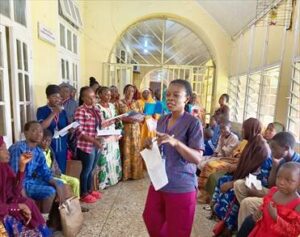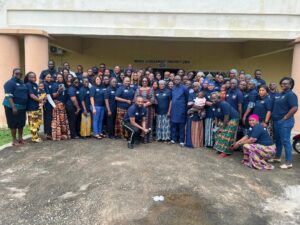According to the World Health Organization, 240,000 babies are born each year with sickle cell disease (SCD) on the continent of Africa, and 80% of them will die before age five from severe infections or acute chest syndrome. But we talked to one Nigerian family who found a screening program they believed saved their infant son’s life. “There was newborn screening going on at the healthcare center where I took my son Sean to get his immunization,” Debbie explained. “It’s not a popular thing in our country, but we wanted to know the genotype of our baby.”
Why Debbie Wanted a SCD Screening For Her Baby
Debbie was aware that she had the sickle cell trait. “My husband didn’t know until a few years earlier that he also had the trait. We discovered that after our first child was born 11 years ago when we lived in the UK, where they regularly screen newborns for SCD, that child has the trait as well.”
The screening revealed Sean had SCD, and, as a result, he was about to begin treatments. “He was given penicillin b and folic acid right away. He hasn’t any crises, and he is wonderful,” Debbie says. “We are very grateful because we adhere to his medications and doctor’s advice.” Most people in this country don’t know their child has SCD until their child falls sick.

What is the CONSA Program?
Debbie took advantage of a program offered by the American Society of Hematology’s Consortium on Newborn Screen in Africa (CONSA). According to Dr. Mohandes Narla, ASH president, the program has been available in seven Sub-Saharan African countries since 2020, including Ghana, Liberia, Nigeria, Kenya, Tanzania, Uganda, and Zambia. “Our goal is to screen 100,000 babies in each of these countries for a total of 700,000 over the next few years,” Dr Narla says. “So far, we have screened 120,000 total and will continue to screen until we reach our targeted number.”
What Happens After the Screenings?
Dr. Narla explains that once they have identified the newborns with SCD, they are given prophylactic penicillin to prevent infections and immunization for all the necessary immunizations that these children need to survive. “We also use reasonably effective treatments to control the disease, for example, hydroxyurea. And are also working with these countries to get programs underway,” he says. “But, again, the problem may be the cost of the drugs and making sure people can access reasonable, available, therapeutic strategies as they get older.”
How Are They Getting the Word Out?
According to Debbie, few people in Nigeria know that testing is available. She was fortunate to be asked if she wanted it at the healthcare center she took her son to for his immunization. It is probably a similar scenario in many other countries. They actively engage with community groups and local programs, but they need more assistance to reach scale. Dr. Narla said, “But unless we get the public health officials and the Ministries of Health in these countries to realize how important this problem is and how it can be solved with reasonable effectiveness, then it will continue to be a challenge.”
However, Dr. Narla says ASH remains committed to the CONSA’s success.







